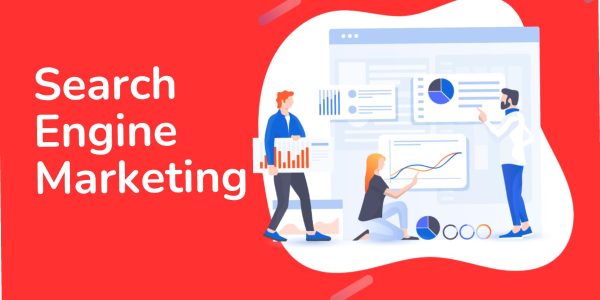
In today’s digital world, having a beautiful website is just the start. Getting people to actually find your website? Now, that’s the real challenge. Enter Search Engine Marketing (SEM)—a dynamic, two-part strategy that combines organic and paid methods to make sure your brand gets noticed.
If you’re looking to boost traffic, increase leads, and get your business seen by the right people at the right time, SEM is the answer. Let’s break it down and explore why SEM might just be your new best friend in the digital space.
What Exactly Is SEM and Why Should You Care?
Think of Search Engine Marketing (SEM) as your digital spotlight. It’s the art of making your business appear in search results when people are looking for what you offer. It combines Search Engine Optimization (SEO) (getting your site to rank high organically) and Pay-Per-Click (PPC) ads (paying to jump to the top of search results instantly).
Imagine owning a small bakery. You have amazing pastries, but unless someone walks past your shop, they won’t know you exist. SEM is like putting up a huge sign that says, “Best Croissants in Town!” so everyone in the area knows where to find you.
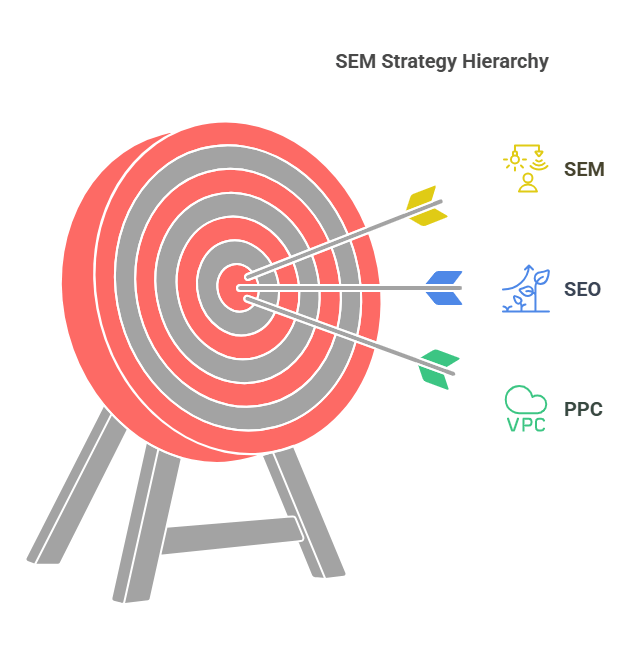
Why Should You Care About SEM?
It’s simple: Visibility. If people can’t find you online, they won’t buy from you. With SEM, you can:
-
Drive traffic to your site faster than relying on SEO alone.
-
Target your ads to specific people who are actively searching for your products.
-
Increase sales by putting your brand right in front of your audience at the moment they need you.
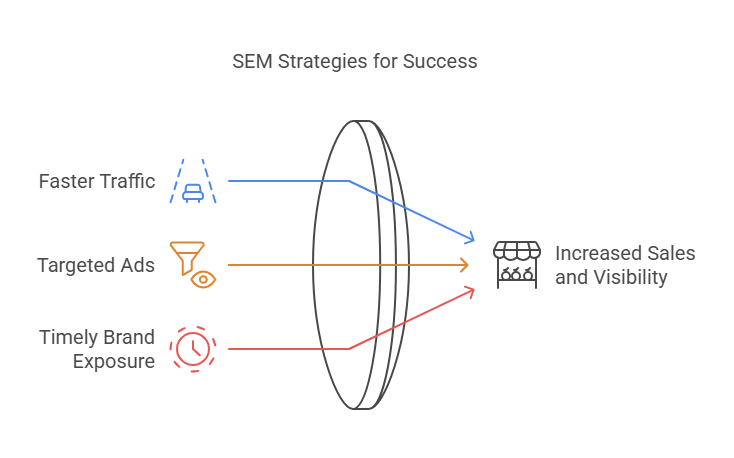
The Catch: SEM Can Be a Bit of a Rollercoaster Ride
One tricky part of SEM is dealing with the volatility of search results. If you’ve ever Googled something and noticed the search results change over time, that’s because search engines, like Google, constantly update their algorithms. These changes can cause your organic ranking to drop, even if you’re doing everything right.
What Can You Do About It?
That’s where paid search ads come in. Even if the organic results fluctuate, your PPC ads keep you visible at the top. It’s like securing VIP seats at a concert—you’re guaranteed a spot in front of your audience, no matter how crowded it gets.
How Does SEM Work? Let’s Break It Down
SEM might sound like a complex digital sorcery, but it’s more like a well-choreographed dance. Here’s how it works step-by-step:
-
Campaign Setup: This is where you decide what you want to achieve. Are you aiming for more website visits, or do you want to sell a specific product?
-
Keyword Research: Think about what your customers are searching for. Keywords are like the breadcrumbs that lead them to you.
-
Ad Creation: Write snappy, engaging ads that make people want to click. (Hint: Make them irresistible!)
-
Ad Auction: Every time someone searches for your keyword, there’s an auction between different businesses for the top spot. The winner gets the prime real estate (top of the search results).
-
Performance Monitoring: Keep track of how your ads are doing, and tweak them to make sure you’re getting the best bang for your buck.
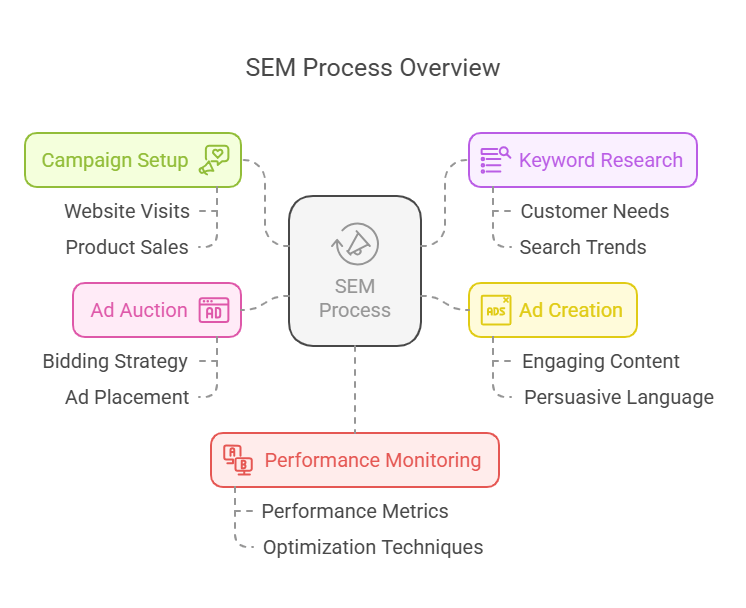
Organic Search Results vs. Paid Results: What’s the Difference?
Let’s say you’re Googling “best running shoes.” The first couple of results you see are probably paid ads, and below them are organic results. What’s the difference?
-
Organic Results: These are unpaid search results that rank based on SEO. If your website is optimized (i.e., great content, fast load times, relevant keywords), Google rewards you with a high ranking.
-
Paid Results: These are ads businesses pay for to appear at the top. If you bid on the right keywords and have a high-quality ad, your business shows up first.
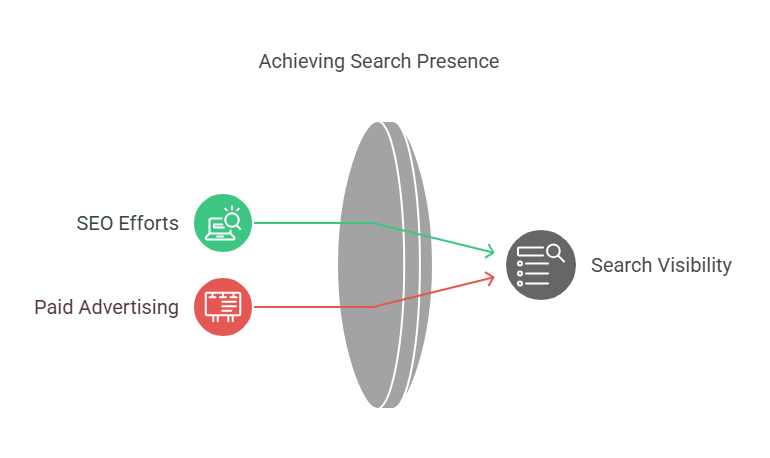
Which One Should You Focus On?
Ideally, both! Paid ads give you immediate visibility, while organic results build trust over time. Combining the two is like having a one-two punch—you get noticed now and build long-term credibility.
Why Should Businesses Love SEM?
SEM offers a buffet of benefits for businesses, whether you’re just starting out or already established. Here’s why it works so well:
-
Increased Visibility: SEM puts you in front of people who are actively searching for your products or services. That’s golden!
-
Targeted Advertising: You can fine-tune your ads based on location, age, interests, or even the time of day. No wasted effort!
-
Measurable Results: You get detailed reports on what’s working. You can track every click, every conversion, and every dollar spent.
-
Cost-Effective: With SEM, you only pay when someone clicks on your ad. It’s like only paying for a cup of coffee when you take a sip—no wasted money.
-
Quick Results: While SEO takes time to build, SEM delivers traffic fast. Perfect for limited-time offers or product launches.
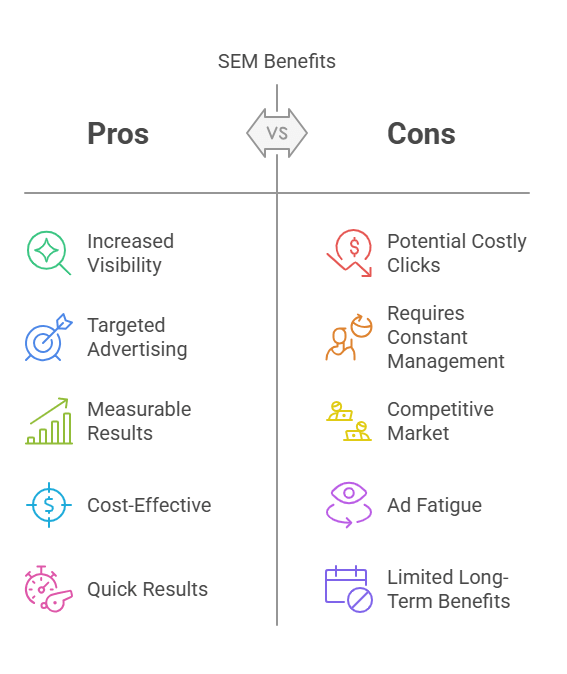
How to Nail an Effective SEM Strategy
Building a winning SEM strategy isn’t rocket science, but it does take a bit of thought and planning. Here are a few tips to get started:
-
Use the Right Keywords: Think like your customer. What would they search for? Long-tail keywords (like “best shoes for flat feet”) are often less competitive but super effective.
-
Write Killer Ads: Your ad needs to grab attention. Highlight what makes you special—whether it’s a sale, a unique product, or a standout service.
-
Optimize Your Landing Pages: Once people click, your landing page needs to deliver. Make sure it’s fast, clear, and focused on converting visitors into buyers.
-
A/B Test Everything: Try different headlines, calls to action, and images to see what works best. Testing = better results.
-
Use Ad Extensions: These are extra bits of info (like phone numbers or additional links) that make your ads even more clickable.
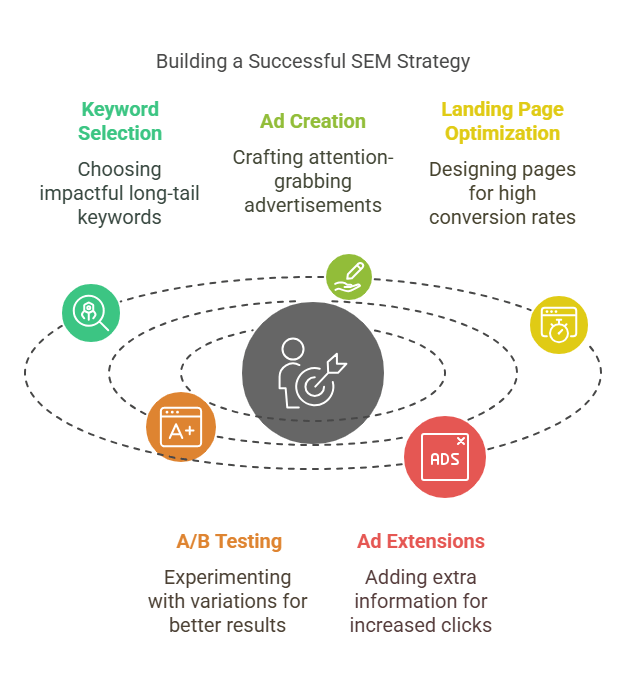
How Does Google Decide Who Wins the Ad Auction?
Google uses a few key factors to decide which ads to show and where they appear. It’s not just about who bids the most!
-
Bid Amount: How much are you willing to pay for each click?
-
Quality Score: Google’s way of measuring how relevant and useful your ad is. A higher score means better ad positions and lower costs.
-
Ad Relevance: How well does your ad match what people are searching for?
So, even if you have a smaller budget, you can still come out on top if your ads are well-written and relevant.
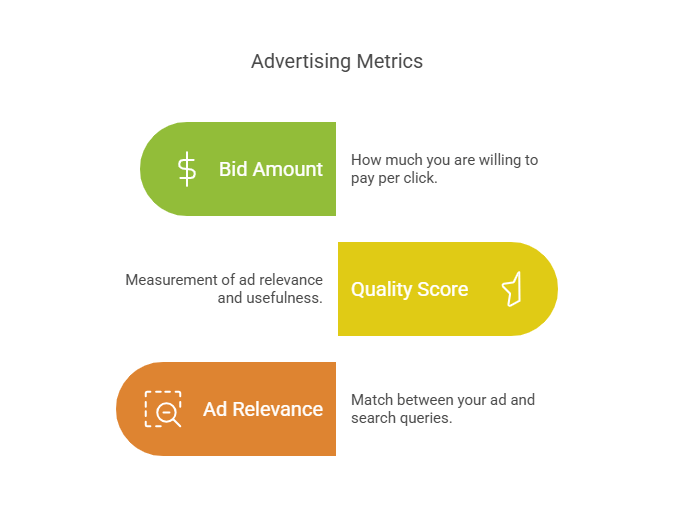
Conclusion: SEM Is Your Digital Marketing Superpower
Whether you’re launching a new business or trying to give your current website a boost, Search Engine Marketing is the secret sauce to get noticed online. With the right mix of SEO and PPC, you can ensure that your brand is front and center when your customers are ready to buy.
So, ready to get started? Grab that digital spotlight and shine bright!


